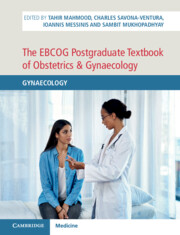Book contents
- The EBCOG Postgraduate Textbook of Obstetrics & Gynaecology
- The EBCOG Postgraduate Textbook of Obstetrics & Gynaecology
- Copyright page
- Dedication
- Contents
- Videos
- Contributors
- Preface
- Section 1 Basic Sciences in Gynaecology
- Section 2 Menstrual Disorders
- Section 3 Reproductive Endocrinology and Infertility
- Chapter 11 Primary and Secondary Amenorrhoea
- Chapter 12 Recurrent Pregnancy Loss in the First and Second Trimesters
- Chapter 13 Polycystic Ovary Syndrome
- Chapter 14 Hirsutism and Virilism
- Chapter 15 Female and Male Infertility
- Chapter 16 Assisted Conception Techniques
- Chapter 17 Ovarian Hyperstimulation Syndrome
- Chapter 18 Legal and Ethical Issues in Assisted Conception Treatment
- Chapter 19 Premature Ovarian Insufficiency
- Section 4 Contraception and STIs
- Section 5 Post-Reproductive Care
- Section 6 Vulva and Vagina
- Section 7 Cervix
- Section 8 Uterus
- Section 9 Ovary and Fallopian Tubes
- Section 10 Operative Gynaecology
- Section 11 Public Health Issues in Gynaecology
- Section 12 Miscellaneous
- Index
- Plate Section (PDF Only)
- References
Chapter 18 - Legal and Ethical Issues in Assisted Conception Treatment
from Section 3 - Reproductive Endocrinology and Infertility
Published online by Cambridge University Press: 24 November 2021
- The EBCOG Postgraduate Textbook of Obstetrics & Gynaecology
- The EBCOG Postgraduate Textbook of Obstetrics & Gynaecology
- Copyright page
- Dedication
- Contents
- Videos
- Contributors
- Preface
- Section 1 Basic Sciences in Gynaecology
- Section 2 Menstrual Disorders
- Section 3 Reproductive Endocrinology and Infertility
- Chapter 11 Primary and Secondary Amenorrhoea
- Chapter 12 Recurrent Pregnancy Loss in the First and Second Trimesters
- Chapter 13 Polycystic Ovary Syndrome
- Chapter 14 Hirsutism and Virilism
- Chapter 15 Female and Male Infertility
- Chapter 16 Assisted Conception Techniques
- Chapter 17 Ovarian Hyperstimulation Syndrome
- Chapter 18 Legal and Ethical Issues in Assisted Conception Treatment
- Chapter 19 Premature Ovarian Insufficiency
- Section 4 Contraception and STIs
- Section 5 Post-Reproductive Care
- Section 6 Vulva and Vagina
- Section 7 Cervix
- Section 8 Uterus
- Section 9 Ovary and Fallopian Tubes
- Section 10 Operative Gynaecology
- Section 11 Public Health Issues in Gynaecology
- Section 12 Miscellaneous
- Index
- Plate Section (PDF Only)
- References
Summary
Forty-two years have passed since the birth of the first child conceived after IVF of a human oocyte and subsequent transfer into the uterus of the ensuing embryo. Since then, the methods of medically assisted reproduction (MAR) are being widely applied all over the world but, at the same time, scientists, policy makers and ethicists have started the debate regarding the necessity of laws and regulations governing the application of these methods, especially due to the possible risks associated with their application.
This chapter highlights the main legal and ethical issues associated with assisted conception, especially the fact that the lack of a common and binding position among European countries gives rise to problems of particular importance (i.e. non-egalitarian access of all European citizens to the achievements and advancements of reproductive technology, reproductive tourism, or problems associated with international scientific cooperation).
Keywords
- Type
- Chapter
- Information
- The EBCOG Postgraduate Textbook of Obstetrics & GynaecologyGynaecology, pp. 146 - 151Publisher: Cambridge University PressPrint publication year: 2021

